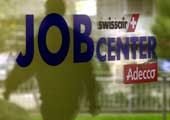Confidence slips within Swiss households

Consumer confidence has dropped to its lowest level since the September 11 terrorist attacks while unemployment has risen slightly.
The latest economic indicators appear to back up the Central Bank’s forecast that growth is stalling. The Bank cut interest rates last month, after revising downwards its predictions for growth, saying it would likely fall short of one per cent this year.
“This is a clear warning sign,” said Jan Poser, an economist at Bank Sarasin. “It is a second round effect – the strong Swiss franc reduced exports, that lead to problems at export firms and higher joblessness and that in turn weighs on consumer confidence.”
The State Secretariat for the Economic Affairs (Seco) reported that households had become more pessimistic in their judgement of the economy and their financial situation in the past year.
A survey of 1,100 households showed that the quarterly index of consumer confidence dropped to minus 18 in July compared with minus nine in April.
Jobless numbers up
Seco also reported that unemployment nudged up 0.1 per cent from June to 2.6 percent in July. A total of 92,948 people were unemployed in July, 2,243 more people than the previous month. The unemployment rate was at 1.7 per cent a year ago.
The latest data follows cuts in growth forecasts for Switzerland’s economy, which has been suffering knock-on effects of delayed economic recoveries in the United States and Europe, as well as a strong Swiss franc.
The consumer confidence survey was carried out in the first week of July before the drastic fluctuations on global stock markets, which are thought likely to dent confidence even further.
The index fell deeper than economists had expected, plunging to a level not seen since October last year, when the first survey was held after the attacks in the US.
Last month, the Swiss National Bank announced that the economic recovery would be delayed with gross domestic product falling “considerably short” of the one per cent it had previously forecast.
This was a key factor in the SNB’s decision to cut interest rates by half a percentage point in July. Its key London interbank offered rate – Libor – to a range of 0.25 – 1.25 per cent.
The strong Swiss franc is an obstacle to Swiss exports as it makes them more expensive. The trend tends to lead to higher unemployment in Switzerland, which in turn weighs on consumer confidence, according to analysts.
swissinfo with agencies

In compliance with the JTI standards
More: SWI swissinfo.ch certified by the Journalism Trust Initiative
You can find an overview of ongoing debates with our journalists here . Please join us!
If you want to start a conversation about a topic raised in this article or want to report factual errors, email us at english@swissinfo.ch.